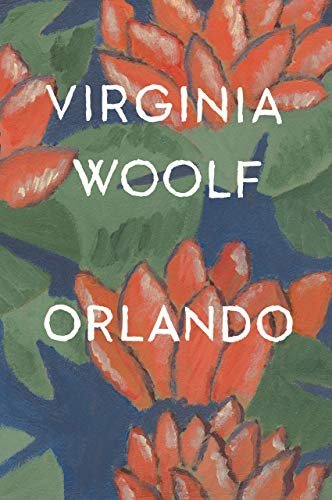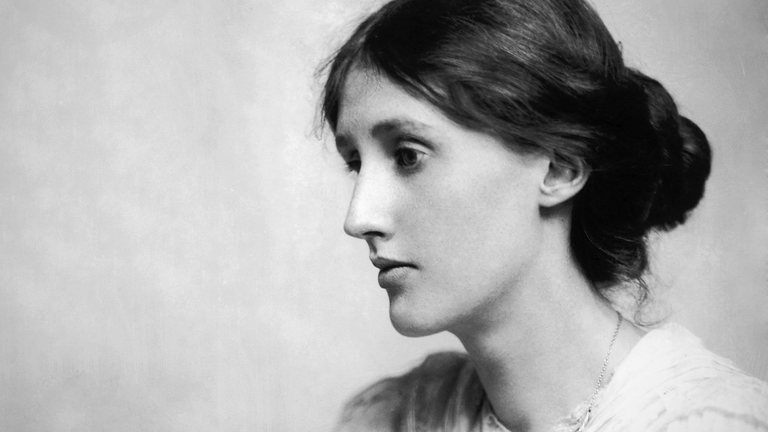Orlando: Book Review - Orlando: Reseña de Libro (ENG/ESP)
Hello dear book lovers.
Hola queridos amantes de los libros.
I owe part of my addiction to literature to Virginia Woolf; something about her writing always captivates me. Perhaps, because her prose carves on paper the image of a strong, avant-garde, solemn and powerful woman. In each of his novels I felt moved, surrounded by those stories where the feminine essence stands in front of an elitist society, self-described as "indestructible" but internally fragile: the figure of man, sexuality and gender vanish before the modern thought of Woolf, who maximized the literary concept and revamped it under a completely different argument. And in this powerful change brought by the hands of Virginia, there is "Orlando", a story that touches on a theme that is still present in this century: gender discrimination.
Parte de mi adicción a la literatura se la debo a Virginia Woolf; algo en su escritura siempre me cautiva. Tal vez, porque su prosa talla sobre el papel la imagen de una mujer fuerte, vanguardista, solemne y poderosa. En cada una de sus novelas me sentí conmovido, rodeado de esas historias donde la esencia femenina se interpone ante una sociedad elitista, autodenominada “indestructible” pero internamente frágil: la figura del hombre, la sexualidad y el género se desvanecen ante del pensamiento moderno de Woolf, el cual maximizó el concepto literario y lo renovó bajo un argumento completamente diferente. Y en este poderoso cambio traído por las manos de Virginia, está “Orlando”, una historia que toca un tema aun presente en este siglo: la discriminación de género.
Orlando, misunderstood woman, obsolete among so many social injustices. Yes, he, a woman's body but internally a man, has to suffer the details of an unbalanced world and intentionally labeled by an absurd masculinity. Virgina Woolf immerses us in fantasy with a realistic freedom, capable of representing the historical events that had to succumb the England of excessive thought. The logic in this novel is not limited to showing the details of the woman, as it also ridicules the judgment to which she is subjected, involving the concept of identity and conscience.
Orlando, mujer incomprendida, obsoleta entre tantas injusticas sociales. Sí, él, cuerpo de mujer pero internamente hombre, ha de sufrir los pormenores de un mundo desequilibrado e intencionalmente etiquetado por una masculinidad absurda. Virgina Woolf nos sumerge en la fantasía con una libertad realista, capaz de representar los hechos históricos que habían de sucumbir la Inglaterra del pensamiento desmesurado. La lógica en esta novela no se limita a mostrar los pormenores de la mujer, pues también ridiculiza el juicio al que es sometida, involucrando el concepto de la identidad y la conciencia.

Source-fuente
Virgina was inspired by her own sentimental experience to write this avant-garde novel on the spectrum of literature, appealing to the love relationship that once overshadowed her eyes. With a vigorous narrative style, Orlando is described to us in the context of a conflictive society, somewhat chipped by war and strange customs. This story is undoubtedly one of the most significant and controversial pieces of literature, and also reinforces the hypothetical imbalance in sexual roles.
Virgina se inspiró en su propia experiencia sentimental para escribir esta novela vanguardista en el espectro de la literatura, apelando a la relación amorosa que alguna vez eclipsó sus ojos. Con un estilo narrativo vigoroso, Orlando se nos describe en el contexto de una sociedad conflictiva, algo chipoteada por la guerra y las raras costumbres. Esta historia es sin duda, una de las piezas más significativas y controversiales de la literatura, y que además, refuerzan el hipotético desequilibrio en los roles sexuales.
This review, in addition to outlining the flagrant work of Virginia Woolf, is a tribute to her imposing legacy. Because she, Virginia, continues to represent the maximum expression of the avant-garde woman.
Esta reseña, además de bosquejar la flagrante obra de Virginia Woolf, es un homenaje a su imponente legado. Porque ella, Virginia, sigue representando la máxima expresión de la mujer vanguardista.

Orlando: an adventure for identity and conscience
Orlando: una aventura por la identidad y la conciencia
This novel is presented as a kind of biography, let's say it is a not so long story. The main character is Orlando, a distinctive young man who, in addition to being passionate about literary works, is a close friend of royalty. The narrator describes the historical characteristics of the settings, making them his own, moldable, without limiting references. One day we are in Elizabethan England and the other in the industrial revolution; All these scenarios serve to relate the adventure that Orlando must face, who after a love disappointment and a professional disappointment wakes up transformed into a woman.
Esta novela es presentada como una especie de biografía, digamos que es una historia no tan extensa. El personaje principal es Orlando, un joven característico que además de ser un apasionado de las obras literarias, es un amigo cercano de la realeza. El narrador describe las características históricas de los escenarios haciéndolas propias, moldeables, sin referencias limitantes. Un día estamos en la Inglaterra del Isabelino y al otro en la revolución industrial; todos estos escenarios sirven para relatar la aventura a la que debe enfrentarse Orlando, quien después de un desengaño amoroso y una decepción profesional despierta transformado en una mujer.
From then on it is no longer him, it is her; her body has a different configuration, much more pronounced. It is him and at the same time it is she: it is the union in body and soul between two different sexes. In the eyes of the world Orlando vanished forever, he no longer exists, he is nothing more than a whisper of memory. However, in his own eyes, Orlando continues to exist, that is: he is still the same person as always. Here is Virginia's masterful touch: "sexuality does not define us, or it appears from our body, but the very essence of our inner being." At this point, the idea of "Gender" is completely subjective, after all, being male or female does not define the identity of our spirit.
A partir de ahí ya no es él, es ella; su cuerpo tiene una configuración distinta, mucho más pronunciada. Es él y a la vez es ella: es la unión en cuerpo y alma entre dos sexos diferentes. A los ojos del mundo Orlando se desvaneció para siempre, ya no existe, no es más que un susurro del recuerdo. No obstante, a sus propios ojos, Orlando sigue existiendo, es decir: sigue siendo la misma persona de siempre. He aquí el toque magistral de Virginia: “no nos define la sexualidad, o la aparecía de nuestro cuerpo, sino la propia esencia de nuestro ser interior.” En este punto, la idea del “Género” es completamente subjetiva, después de todo, ser hombres o mujeres no define la identidad de nuestro espíritu.

Ironic narrative and without so many "conceits"
Narrativa irónica y sin tantos “tapujos”
Oh, Virginia, you were a genius for prose!
Oh, Virginia, ¡vaya que fuiste un genio para la prosa!
The narrative in Orlando is in the third person, energized with allegorical writing. Virginia Woolf is not limited to heavy descriptions, since her narration is specified in the character's own singularities. As always, they exude mocking, ironic tones, pretentiously exaggerated to give color to the scenes. Laughing is easy, even in the most serious and unexpected contexts. The most outstanding particularity of her is precisely that voice that does not contain itself to relate injustices, machismo and even much more taboo subjects such as homosexuality itself. Each of these topics is exposed under a vigorous and successful allegory in coherent terms. I have no doubt that Orlando, this symbol of conviction and identity, is one of the best written stories in literature.
La narrativa en Orlando es en tercera persona, dinamizada con una escritura alegórica. Virginia Woolf no se limita a las descripciones pesadas, pues su narración se puntualiza en las propias singularidades del personaje. Como siempre, destilan los tonos burlones, irónicos, pretenciosamente exagerados para darle color a los escenarios. Carcajear es fácil, incluso en los contextos más serios e inesperados. La particularidad más destacada es precisamente esa voz que no se contiene para relatar las injusticias, el machismo e incluso temas mucho más tabúes como la propia homosexualidad. Cada uno de estos tópicos queda al descubierto bajo una alegoría vigorosa y acertada en términos coherentes. No me queda ninguna duda de que Orlando, este símbolo de la convicción y la identidad, es una de las historias mejores escritas de la literatura.

Man: another form of woman
El hombre: otra forma de mujer
Virginia did not want to compare men and women in any way, as her intention was to show that the barriers of gender are completely ridiculous. Orlando serves as a heel to exemplify this allegory, since being transformed into a woman after a long lethargy, he must fight to regain what is his by facing those who see him as a vulnerable piece, which must be ignored for the simple fact of being a woman. The evidence is clear: there is no weaker sex, it is only imposed by those who have martyred the idea of freedom of rights without conditions. We do not have to be limited whether we are men or women, because our sexuality does not identify us; what really matters lies in the gifts and talents that define us as human beings.
Virginia no quiso comparar de alguna manera al hombre y la mujer, pues su intención era demostrar que las barreras del género son completamente ridículas. Orlando sirve de talón para ejemplificar esta alegoría, ya que al ser transformado en mujer tras un largo letargo, debe luchar para recuperar lo que es suyo enfrentándose a los que lo ven como una pieza vulnerable, que debe ser ignorada por el simple hecho ser una mujer. La evidencia es clara: no existe el sexo débil, solo es impuesto por aquellos que han martirizado la idea de la libertad de derechos sin condiciones. No tenemos por qué ser limitados seamos hombres o mujeres, pues nuestra sexualidad no nos identifica; lo que realmente importa, radica en los dones y talentos que nos definen como seres humanos.

Final Appreciation
Apreciación Final
Orlando is one of the novels that I have enjoyed the most in my period as a young reader, and I say young because I read the story in my high school days. From my humble point of view, Virginia Woolf faced a great challenge in writing this book, since the laws and beliefs of her time abolished any current that was contrary to "elitist" custom. That is why this work has meant a lot to literature, not only as an art of large letters, as it has also been an icon in universal reflection for thought and the way of seeing that reality that very few see, but which is there. , latent, waiting to be discovered.
Orlando es una de las novelas que más he disfrutado en mi periodo de joven lector, y digo joven porque leí la historia en mis épocas de bachillerato. Desde mi humilde punto de vista, Virginia Woolf se enfrentó a un gran desafío al escribir este libro, ya que las leyes y las creencias de su época abolían cualquier corriente que fuera contraria a la costumbre “elitista”. Es por eso que esta obra ha significado mucho para la literatura, no solo como un arte de grandes letras, pues también ha sido icono en la reflexión universal para el pensamiento y la forma de ver esa realidad que muy pocos ven, pero que está ahí, latente, esperando a ser descubierta.

More about the Author
Más acerca de la Autora
Virginia Woolf (1982-1941) is considered one of the most important figures in literature; her works touch on true issues, gender discrimination being the most common. Born in Great Britain, Virginia became popular after a series of novels in which the figure of women began to be more prominent. In 1928 she wrote Orlando, a drama and fantasy story inspired by her love affair with fellow writer Vita Sackville-West. This work revolutionized the concept of gender, identity and sexuality, and above all, the role of women in modern society.
Virginia Woolf (1982-1941) es considerada como una de las figuras más importantes de la literatura; sus obras tocan temas verídicos, siendo la discriminación de género el más usual. Nacida en la Gran Bretaña, Virginia se popularizó tras una serie de novelas en las cuales la figura de la mujer comenzó a ser más prominente. En 1928 escribe Orlando, una historia de drama y fantasía inspirada en su relación amorosa con la también escritora Vita Sackville-West. Esta obra revolucionó el concepto del género, la identidad y la sexualidad, y por sobretodo, el rol de la mujer en la sociedad moderna.


Congratulations @gabolegends! You have completed the following achievement on the Hive blockchain and have been rewarded with new badge(s):
Your next target is to reach 500 replies.
You can view your badges on your board and compare yourself to others in the Ranking
If you no longer want to receive notifications, reply to this comment with the word
STOPCheck out the last post from @hivebuzz:
Support the HiveBuzz project. Vote for our proposal!
https://twitter.com/gabolegends/status/1481324431075155974
The rewards earned on this comment will go directly to the person sharing the post on Twitter as long as they are registered with @poshtoken. Sign up at https://hiveposh.com.